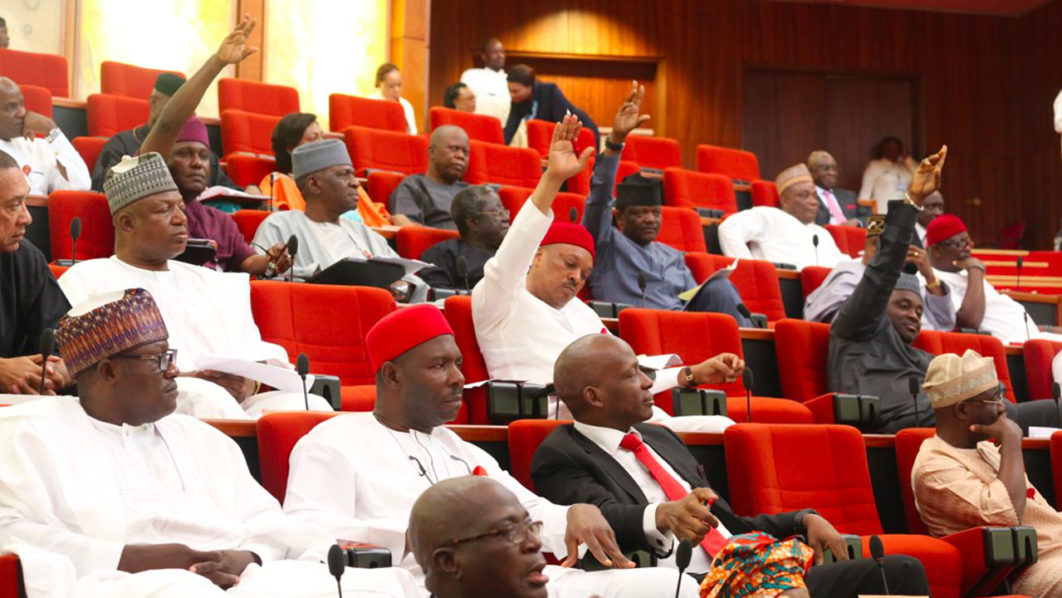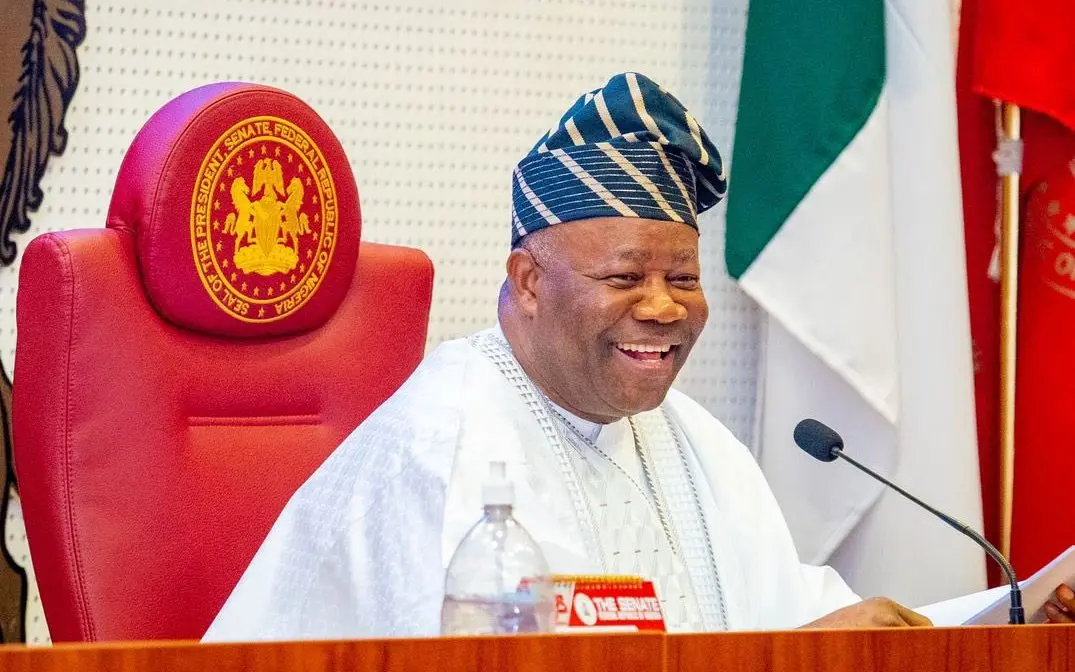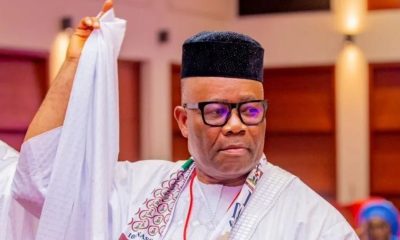General
Bill to Stop Annual Rents in FCT Passes Second Reading at Senate

By Modupe Gbadeyanka
A bill to regulate payment mode for rents in the Federal Capital Territory (FCT) Abuja on Tuesday scaled the second reading at the Senate.
The upper chamber of the National Assembly wants to make it illegal for property owners to collect annual rents from tenants but on a monthly basis.
The sponsor of the bill tagged A Bill for the Regulation of Advanced Rent on Residential Apartments, Office Space, Mr Smart Adeyemi, argued that it would make life less stressful for residents of the city.
He explained that the bill seeks to regulate the mode of payment of rent on residential apartments, office space, rooms and accommodation in the FCT.
“If passed, this bill will improve the well-being and standard of living of residents and minimise corruption and immorality emanating from the oppressive tenancy system in the Federal Capital Territory.
“This bill will make life less stressful and less painful for the majority of the down-trodden and low-income earners in the Federal Territory,” Mr Adeyemi said.
He explained further that due to the global economic recession, life has become very challenging and almost unbearable for the low-income earners despite the huge palliative measures by the federal government through the N-POWER traders money.
He noted that in the FCT, landlords demand between one to three years of advanced rent, a situation which he pointed “automatically adds a huge burden on the masses, subsequently giving rise to desperation and corruption.”
The lawmaker lamented that the “tenancy system has continuously impoverished Nigerians who are salaried employees that can only pay rent after haven received their first remuneration.”
“This tenancy system is un-African, unIslamic and indeed unbiblical,” he added, expressing concerns that many residents of the FCT are finding it difficult to cope with huge rent payment, adding that, “many houses built within the city centre for such purposes are empty.”
He said that yearly tenancy has continued to breed corruption, moral decadence and huge inequality as low-income earners cannot afford to continually pay their rent.
According to him, some tenants now engage in corrupt practices, immorality, and even criminal acts to meet the pressing need for shelter.
He underscored the need for Legislation aimed towards justice, fairness, equity and improved standard of living.
He noted that in the FCT, a single one-room apartment ranges from N1 million to N2 million within the city, noting that in the satellite towns such as Kubwa, Nyanya, Kuje, Lugbe, rents are still not affordable for the common man as it ranges from N350,000 to N500,000.
He stated that the bill, therefore, seeks to reduce advance payment for new tenants to three months and, thereafter, proceed with the monthly payment scheme.
“It also seeks to protect low-income earners from any form of oppression by homeowners.
“The bill also seeks to provide a window for legal action for any form of oppression.
“Importantly, it will also serve as a safety net for Landlords against erring tenants,” he added.
Contributing to the debate, Mr Aliyu Sabi Abdullahi, while supporting the bill, described the piece of legislation as “people-centred.”
He said, “The truth is out there, many residents in the FCT are groaning under this very difficult system where people are expected to pay house rent in advance.
“With the policy where the government has withdrawn participation in providing official quarters with demonetization, we are all aware, young Nigerians who are gaining employment within the precinct of the FCT for example, majority of them are actually in the outskirts.
“This is because it is extremely difficult for most of these young Nigerians to get the quantum of money that represents two years rent.
“[And] so, Mr President, I think we are doing the right thing if we look at the intendment of this bill.
“If there is a good system as this, where on a monthly basis as the man receives his salary, he is making payment for what he has consumed, I think it will be a very good and welfare-oriented system, one that is friendly to those that do not have.”
The Deputy Senate President, Mr Ovie Omo-Agege, who presided over the plenary, described the bill as “popular” owing to the number of Nigerians who have shown interest in it.
However, Mr Chimaroke Nnamani, the only lawmaker in the chamber who spoke against the bill, argued the issue of rent payment should be driven by market forces.
“The issue of rental payment, either in advance or instalments is purely economical and should be driven by market forces.
“Such market forces as availability of land, cost of building materials and income.
“If the government wants to ameliorate the sufferings of the masses, the government can go into housing schemes, mortgage schemes, housing credit facilities, not control the business of private individuals in an emerging African democracy.
“I, therefore, oppose, and oppose vigorously this bill”, he said.
Senators, however, voted overwhelmingly in support of the bill when the Deputy Senate President put the question for it to be read a second time.
The bill was subsequently referred by Mr Omo-Agege to the Committee on Housing and Urban Development for further inputs.
The committee was given four weeks to report back to the Senate in plenary.
General
Nigeria Signs Defence Joint Venture with Terra Industries

By Adedapo Adesanya
Nigeria has signed a joint venture with defence technology company, Terra Industries Limited, as part of efforts to boost the country’s defence industrial capacity and advance indigenous high-technology development.
The Defence Industries Corporation of Nigeria (DICON) and Terra signed a Memorandum of Understanding (MoU) for the establishment of the Joint Venture Company (JVC), both parties announced on Monday.
The partnership provides a robust framework for the local production, assembly, research and development (R&D), and training in high-technology systems, including drones, cybersecurity solutions, robotics, and other ancillary software and hardware platforms.
The MoU, executed pursuant to the DICON Act 2023, underscores DICON’s statutory mandate to collaborate with indigenous and foreign defence-related industries through Public-Private Partnerships. Under the agreement, the Joint Venture Company will operate as a subsidiary of DICON, jointly promoted and owned by DICON and Terra Industries, and duly incorporated in Nigeria.
This marks the latest move by Terra, which recently became a $100 million company, following recent raises from investors including Flutterwave CEO, Mr Gbenga Agboola, American actor Jared Leto as well as 8VC founded by the co-founder of Palantir Technologies Inc., Mr Joe Lonsdale. Other investors included Valor Equity Partners, Lux Capital, SV Angel, Leblon Capital GmbH, Silent Ventures LLC, Nova Global.
Terrahaptix, founded by Mr Nathan Nwachukwu and Mr Maxwell Maduka, are using the new funding to expand Terra’s manufacturing capacity as it expands into cross-border security and counter-terrorism.
The latest agreement with DICON is designed to establish advanced production and assembly lines for high-tech equipment within Nigeria, while promoting meaningful technology transfer, skills development, and specialised training for Nigerian personnel.
It also aims to strengthen local sourcing of raw materials, reduce dependence on imports, and enhance domestic industrial capacity and strategic autonomy. Additionally, the partnership will support the supply of security equipment to the wider Nigerian security agencies, other security agencies, positioning Nigeria as a competitive player in the global defence manufacturing sector.
Under the agreement, Terra Industries will provide technical expertise, professional services, and training, and will attract both local and foreign investment to strengthen the defence industrial ecosystem.
The company will also facilitate the procurement of production equipment, coordinate local and international training programmes, and provide access to manufacturing know-how, tooling, spare parts, and established defence sector supply chains.
Speaking on this, Mr Nathaniel Nwachukwu, CEO of Terra Industries, noted that the partnership “Demonstrates confidence in indigenous Nigerian engineering capability and creates a platform for sustainable defence technology development, innovation, and export competitiveness.”
On his part, Major General BI Alaya, the Director General of DICON, described the agreement as “A transformational step toward strengthening Nigeria’s defence manufacturing base, reducing import dependence, and positioning Nigeria as a regional hub for advanced innovation.”
The need for security has risen in recent years, as groups such as Islamic State and al-Qaeda are gaining ground in Africa, converging along a swathe of territory that stretches from Mali to Nigeria.
General
Deep Blue Project: Mobereola Seeks Air Force Support

By Adedapo Adesanya
The Director General of the Nigerian Maritime Administration and Safety Agency (NIMASA), Mr Dayo Mobereola, is seeking enhanced cooperation between the agency and the Nigerian Air Force (NAF) with the aim of strengthening tactical air support within the Deep Blue project.
During a courtesy visit last week, Mr Mobereola told the Chief of Air Staff, Air Marshall S. K. Aneke at the NAF Headquarters in Abuja, that the Air Force was a strategic partner in enhancing maritime security in Nigeria and sustaining the momentum of the Deep Blue Project’s success.
According to the DG, “We are here to seek the Air Force’s support, given the importance of tactical air surveillance to the Deep Blue Project. Nigeria is the only African country with a record of zero piracy within the last 4 years. The Deep Blue Project platforms have been used to achieve zero piracy and sea robberies in the Gulf of Guinea, and we need your collaboration to sustain this momentum”.
He further emphasised that international trade depends on security, which is why vessels prefer to go to or transit through countries where they are secured. “With the traffic we have now, we need to show more security might through collaboration to strengthen our trade viability because of the risks attached to our route. We need these collaborations to sustain what we have achieved so far with the Deep Blue Project”.
The NIMASA DG expressed hope that the collaboration with the Nigeria Air Force will reduce response time.
On his part, the Chief of Air Staff, Air Marshall S.K. Aneke, noted that the Air Force desires to be “a very supportive and collaborative partner with NIMASA and is ready to match the Agency step by step and side by side to achieve the desired results.”
He noted that “collaboration between NIMASA and the Nigerian Air Force under the Deep Blue Project can be strengthened through a joint strategic framework, integrated command structures, and a standing steering committee to ensure shared objectives and accountability.
“Establishing a joint maritime domain awareness fusion cell will enable real-time intelligence sharing, synchronised surveillance, and faster response to maritime threats and ensure sustained operational effectiveness across Nigeria’s territorial waters and exclusive economic zone,” he said, according to a statement.
The Air Force Chief added that the Air Force can also support NIMASA outside the Deep Blue Project operations by providing its own ISR platforms, tactical air support, and rapid airborne deployment for interdictions and search and rescue missions.
While thanking the NIMASA DG for the basic trainings the Agency has provided the aircraft pilots under the Deep Blue Project, Air Marshall Aneke also highlighted areas of operational challenges needing NIMASA’s attention to include bridging the communication gap between NAF operators and NIMASA, higher level and in-depth maintenance trainings, readily available fueling of aircrafts to avoid delays on missions, and provision of flying kits among others.
He therefore pledged the Air Force’s collaboration and assured that the request by NIMASA has been noted and that things will begin to move at thrice its speed going forward.
General
Nigeria’s Democracy Suffocating Under Tinubu—Atiku

By Modupe Gbadeyanka
Former Vice President, Mr Atiku Abubakar, has lambasted the administration of President Bola Tinubu for the turnout at the FCT Area Council elections held last Saturday.
In a statement signed by his Media Office, the Adamawa-born politician claimed that the health of Nigeria’s democracy under the current administration was under threat.
According to him, “When citizens lose faith that their votes matter, democracy begins to die. What we are witnessing is not mere voter apathy. It is a direct consequence of an administration that governs with a chokehold on pluralism. Democracy in Nigeria is being suffocated slowly, steadily, and dangerously.”
He warned that the steady erosion of participatory governance, if left unchecked, could inflict irreversible damage on the democratic fabric painstakingly built over decades.
“A democracy without vibrant opposition, without free political competition, and without public confidence is democracy in name only. If this chokehold is not released, history will record this era as the period when our hard-won freedoms were traded for fear and conformity,” he stressed.
Mr Atiku said the turnout for the poll was below 20 per cent, with the Abuja Municipal Area Council (AMAC) recording 7.8 per cent.
He noted that such civic participation in the nation’s capital, the symbolic heartbeat of the federation, is not accidental, as it is the predictable outcome of a political environment poisoned by intolerance, intimidation, and the systematic weakening of opposition voices.
The presidential candidate of the People’s Democratic Party (PDP) in the 2023 general elections stated that the ruling All Progressives Congress (APC) under Mr Tinubu has pursued a deliberate policy of shrinking democratic space, harassing dissenters, coercing defectors, and fostering a climate where alternative political viewpoints are treated as threats rather than contributions to national development.
He called on opposition parties and democratic forces across the country to urgently close ranks and forge a united front, declaring, “This is no longer about party lines; it is about preserving the Republic. The time to stand together to rescue and rebuild Nigeria is now.”
-

 Feature/OPED6 years ago
Feature/OPED6 years agoDavos was Different this year
-
Travel/Tourism10 years ago
Lagos Seals Western Lodge Hotel In Ikorodu
-

 Showbiz3 years ago
Showbiz3 years agoEstranged Lover Releases Videos of Empress Njamah Bathing
-

 Banking8 years ago
Banking8 years agoSort Codes of GTBank Branches in Nigeria
-

 Economy3 years ago
Economy3 years agoSubsidy Removal: CNG at N130 Per Litre Cheaper Than Petrol—IPMAN
-

 Banking3 years ago
Banking3 years agoSort Codes of UBA Branches in Nigeria
-

 Banking3 years ago
Banking3 years agoFirst Bank Announces Planned Downtime
-

 Sports3 years ago
Sports3 years agoHighest Paid Nigerian Footballer – How Much Do Nigerian Footballers Earn






















